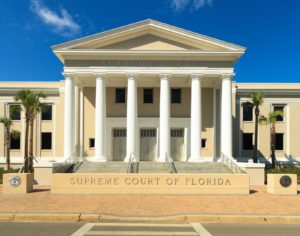By John Haughey
The Center Square
August 17, 2020
 (The Center Square) – The Florida Supreme Court has agreed to hear two cases regarding damages levied against R.J. Reynolds Tobacco Co. for smoking-related deaths that could have profound implications nationwide.
(The Center Square) – The Florida Supreme Court has agreed to hear two cases regarding damages levied against R.J. Reynolds Tobacco Co. for smoking-related deaths that could have profound implications nationwide.
The cases stem from a 2006 Florida Supreme Court ruling, which green-lighted the filing of thousands of “Engle progeny” lawsuits against tobacco companies.
The court’s 2006 ruling upheld a Third District Court of Appeals dismissal of a $144.8 billion liability verdict awarded by a Miami-Dade County jury in a 2000 class-action lawsuit against tobacco companies – the largest punitive damage claim in history – filed by the Tobacco Control Legal Consortium on behalf of 700,000 state smokers.
The Third District Court of Appeals determined a class-action lawsuit was not the “proper vehicle” for such an action, reversing its own 1996 ruling in Engle v. Liggett Group Inc.
Significantly, however, the state high court’s 2006 ruling upheld a number of findings from the Miami-Dade jury ruling in the original class-action lawsuit, including that tobacco companies were negligent, conspired to hide information about the dangers of smoking and sold defective products.
While dismissing the class-action lawsuit, the state Supreme Court said Engle litigants could pursue individual lawsuits against tobacco companies for compensatory damages in which juries could assign a percentage of the blame on plaintiffs.
Altria Group Inc., the maker of Marlboro cigarettes, R.J. Reynolds, whose brands include Winston, and Lorillard Inc. since have settled more than 400 individual Engle claims, paying more than $100 million in compensatory damages.
More than 225 other Engle lawsuits have gone to trial, with 144 resulting in judgments for plaintiffs. Tobacco companies had paid about 56 Engle judgments awarded by juries, totaling $380 million by 2017.
As many as 8,000 Engle lawsuits remain in the litigative pipeline – some nearing 40 years old.
The state Supreme Court agreed last week to take up an Engle case in which a divided 1st District Court of Appeals tossed out a $6.4 million compensatory claim against R.J. Reynolds issued by a Duval County jury in 2016 to the estate of John C. Price.
In a 2-1 ruling last October, an appellate panel dismissed the award and ordered a new trial because, it ruled, the Duval County Circuit judge did not properly instruct the jury about allegations R.J. Reynolds conspired to conceal fraudulent information about smoking.
The jury found R.J. Reynolds to be 40 percent at fault and attributed 60 percent fault to Price, who began smoking at age 12 and smoked up to three packs a day from age 16 to 58, when he quit. Before dying at age 74, he filed the suit.
Attorneys representing Price’s estate and R.J Reynolds asked the court to remedy vagaries defining the standard of proof in determining whether smokers relied on misleading information from tobacco companies about the health dangers of cigarettes.
The Supreme Court also agreed to hear a dispute about a $5 million punitive award issued by an Orange County jury to the estate of Valton Sheffield, who died of lung cancer in 2007.
The 5th District Court of Appeals overturned the award last year because the pre-1999 version of the state’s punitive damages law was applied to the case, which, R.J. Reynolds’ lawyers argued shields it from paying punitive damages.
Attorneys representing Sheffield’s estate asked the Supreme Court to clarify conflicting opinions about punitive-damage tobacco awards being issued by appellate courts.
“Unless the Court accepts jurisdiction and resolves the conflict, there will be two sets of punitive damages rules and remedies that apply to wrongful death cases brought pursuant to Engle, if the class member died after Sept. 30, 1999,” Sheffield attorneys wrote. “Recent history suggests that is a substantial number of cases.”
